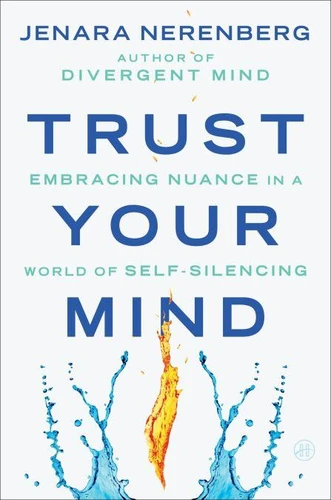Trust Your Mind. Embracing Nuance in a World of Self-Silencing
Par :Formats :
Disponible dans votre compte client Decitre ou Furet du Nord dès validation de votre commande. Le format ePub protégé est :
- Compatible avec une lecture sur My Vivlio (smartphone, tablette, ordinateur)
- Compatible avec une lecture sur liseuses Vivlio
- Pour les liseuses autres que Vivlio, vous devez utiliser le logiciel Adobe Digital Edition. Non compatible avec la lecture sur les liseuses Kindle, Remarkable et Sony
- Non compatible avec un achat hors France métropolitaine
 , qui est-ce ?
, qui est-ce ?Notre partenaire de plateforme de lecture numérique où vous retrouverez l'ensemble de vos ebooks gratuitement
Pour en savoir plus sur nos ebooks, consultez notre aide en ligne ici
- Nombre de pages272
- FormatePub
- ISBN978-0-06-331711-6
- EAN9780063317116
- Date de parution06/05/2025
- Protection num.Adobe DRM
- Infos supplémentairesepub
- ÉditeurHarperOne
Résumé
An urgent examination of self-silencing culture and the toxic impact of groupthink, by the author of Divergent Mind and founder of The Neurodiversity Project. Nerenberg empowers readers with tools to understand the mind and navigate an increasingly polarized world, from campuses and workplaces, to the media and beyond. Connected across geography and culture via the internet, the world is both a vast, limitless landscape and an ever-shrinking echo chamber.
Communication, especially discourse over free speech, is becoming increasingly divisive; one person's right to speak comes into conflict with another seeking to prevent harm. Our tolerance for differing opinions is also narrowing. A "wrong" remark or comment, no matter how seemingly innocent, can result in banishment, and contradictory ideas spark hysteria and backlash-what is referred to as "cancel culture." This polarization affects everyone of us-among friends and families, workplaces and communities-and threatens the fabric of society.
In this timely book, Jenara Nerenberg analyzes this phenomenon of "self-silencing, " asking potent questions about how harmful groupthink has become accepted. Applying her expertise in journalism, psychology, and public health, she digs deep into urgent problems that are worsening under a culture of self-censorship, including loneliness, isolation, and polarization. But there is hope. Nerenberg offers insights for how to identify and escape groupthink and transform fear into empathy, allowing space for authentic communication that reduces-rather than causes-harm to others.
Communication, especially discourse over free speech, is becoming increasingly divisive; one person's right to speak comes into conflict with another seeking to prevent harm. Our tolerance for differing opinions is also narrowing. A "wrong" remark or comment, no matter how seemingly innocent, can result in banishment, and contradictory ideas spark hysteria and backlash-what is referred to as "cancel culture." This polarization affects everyone of us-among friends and families, workplaces and communities-and threatens the fabric of society.
In this timely book, Jenara Nerenberg analyzes this phenomenon of "self-silencing, " asking potent questions about how harmful groupthink has become accepted. Applying her expertise in journalism, psychology, and public health, she digs deep into urgent problems that are worsening under a culture of self-censorship, including loneliness, isolation, and polarization. But there is hope. Nerenberg offers insights for how to identify and escape groupthink and transform fear into empathy, allowing space for authentic communication that reduces-rather than causes-harm to others.
An urgent examination of self-silencing culture and the toxic impact of groupthink, by the author of Divergent Mind and founder of The Neurodiversity Project. Nerenberg empowers readers with tools to understand the mind and navigate an increasingly polarized world, from campuses and workplaces, to the media and beyond. Connected across geography and culture via the internet, the world is both a vast, limitless landscape and an ever-shrinking echo chamber.
Communication, especially discourse over free speech, is becoming increasingly divisive; one person's right to speak comes into conflict with another seeking to prevent harm. Our tolerance for differing opinions is also narrowing. A "wrong" remark or comment, no matter how seemingly innocent, can result in banishment, and contradictory ideas spark hysteria and backlash-what is referred to as "cancel culture." This polarization affects everyone of us-among friends and families, workplaces and communities-and threatens the fabric of society.
In this timely book, Jenara Nerenberg analyzes this phenomenon of "self-silencing, " asking potent questions about how harmful groupthink has become accepted. Applying her expertise in journalism, psychology, and public health, she digs deep into urgent problems that are worsening under a culture of self-censorship, including loneliness, isolation, and polarization. But there is hope. Nerenberg offers insights for how to identify and escape groupthink and transform fear into empathy, allowing space for authentic communication that reduces-rather than causes-harm to others.
Communication, especially discourse over free speech, is becoming increasingly divisive; one person's right to speak comes into conflict with another seeking to prevent harm. Our tolerance for differing opinions is also narrowing. A "wrong" remark or comment, no matter how seemingly innocent, can result in banishment, and contradictory ideas spark hysteria and backlash-what is referred to as "cancel culture." This polarization affects everyone of us-among friends and families, workplaces and communities-and threatens the fabric of society.
In this timely book, Jenara Nerenberg analyzes this phenomenon of "self-silencing, " asking potent questions about how harmful groupthink has become accepted. Applying her expertise in journalism, psychology, and public health, she digs deep into urgent problems that are worsening under a culture of self-censorship, including loneliness, isolation, and polarization. But there is hope. Nerenberg offers insights for how to identify and escape groupthink and transform fear into empathy, allowing space for authentic communication that reduces-rather than causes-harm to others.




